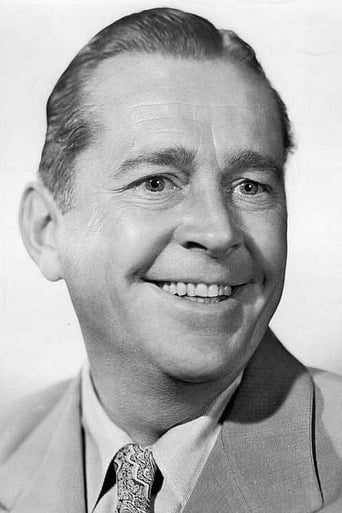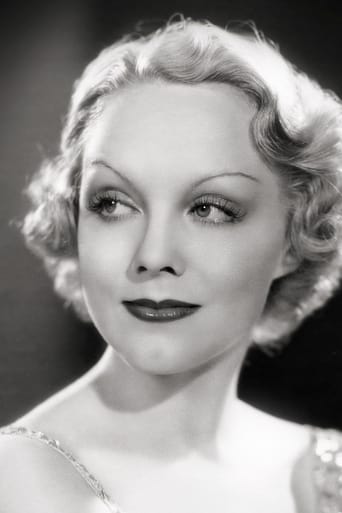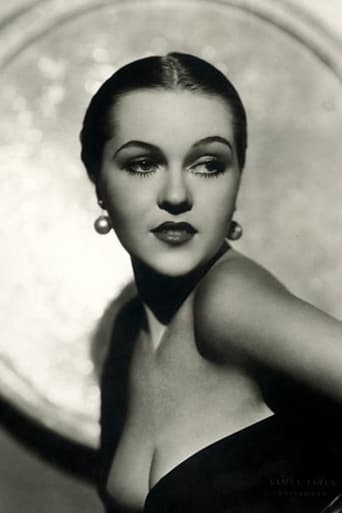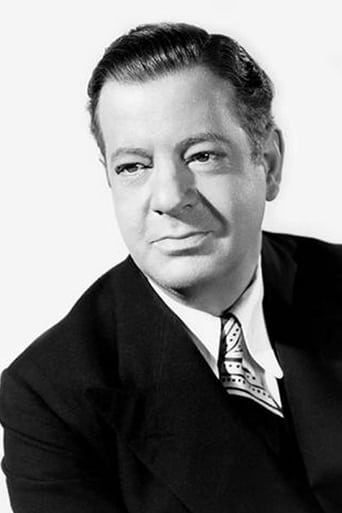Exoticalot
People are voting emotionally.
BeSummers
Funny, strange, confrontational and subversive, this is one of the most interesting experiences you'll have at the cinema this year.
StyleSk8r
At first rather annoying in its heavy emphasis on reenactments, this movie ultimately proves fascinating, simply because the complicated, highly dramatic tale it tells still almost defies belief.
Erica Derrick
By the time the dramatic fireworks start popping off, each one feels earned.
kidboots
Claire Dodd didn't often play leads - she was too good at playing the "other woman". Her blonde beauty and sophisticated air meant she usually played only high society girls but what bad girls they were. She only had to make an appearance and you knew there were going to be tough times ahead for Joan Blondell ("Footlight Parade") or Ann Dvorak ("Crooner") and just to show you how versatile she was, she was also a terrific Della Street in a couple of Perry Mason movies.True to form, although she plays the female lead, Maxine, she is leading her husband, go-getter sports writer, Joe McCoy (James Dunn), a merry dance and her extravagance is the reason he can't seem to make ends meet. When old timer George Gorman can't deliver his column due to illness, Joe takes over and impresses everyone so much he gets a big promotion. Maxine sees that as a green light to spend, spend, spend. Extra responsibility sees Joe covering sports from around the country but Maxine, bored, turns to racketeer, Marty Bleuer (oily old Alan Dinehart) for solace who just happens to be Joe's sworn enemy. Joe sees him at a few sporting events and, smelling a rat, starts to include references to him in his witty sporting column "The Real McCoy". Returning from his sporting junket, he finds Maxine in debt up to her pretty eyes from unpaid gambling debts and Bleuer only willing to forget about it if Joe starts praising him in his column.Turned against by "kith and kin", except Connie (Patricia Ellis), a cute little sports writer who has always carried a torch for him, Joe's hang out is now a waterfront bar. Another of his friends who hasn't forgotten him is news boy Jimmie (Frankie Darro), thanks to Joe, now able to follow his dream of being a jockey and returning the favour by bringing him a big racing scoop involving Bleuer with plenty of race fixing and bribery.By 1935 due to over exposure and not enough variation on stereo typed roles, James Dunn was let go by Fox. He then began his descent into some dreadful programmers. "The Payoff" is pretty decent though and Dunn is surrounded by some top notch players, apart from Claire Dodd, there is Alan Dinehart, Patricia Ellis and Frankie Darro. And director Robert Florey was always able to make ordinary, run of the mill Bs into something pretty special.
Michael_Elliott
Payoff, The (1935) ** (out of 4) Bland programmer about Joe McCoy (James Dunn), a reporter who is pretty much broke thanks to his wife (Claire Dodd) and her bad spending habits. McCoy gets a major break and raise when he's promoted to the top sports reporter but his wife keeps on spending and soon ends up in the arms of a racketeer (Alan Dinehart) who her husband has been trying to bring down for ages. Once she owes the racketeer money he tries to blackmail the reporter. This Warner film has a couple nice touches but the thing just doesn't work thanks in large part to a pretty weak screenplay that seems to just make things up as the movie goes along. Take, for just one example, the character Frankie Darro plays. At the start of the film he's just some kid selling newspapers on the street who dreams of becoming a horse jockey and sure enough, a few months later when the movie needs him to be a jockey, he's now good enough to be riding a major horse at a major Derby. The ending is extremely weak and I won't ruin anything but what we hear happens over the radio is just downright silly and is a rather cheap pay-off. The performances are all a mixed bag but none of the actors have too much to work with. I thought Dunn did a decent job in terms of his performance but I still didn't believe him in the role. The biggest problem, role wise, is that Dunn brings a lot of laid back humor to the part and it just seems to go against what this reporter would really be like. Not once did I buy the type of character Dunn created but at the same time he gave a decent performance. Dodd is really letdown by the screenplay as she pretty much just stands around running up a larger debt. Patricia Ellis comes off quite good as the girl who loves Dunn and Darro is pretty good as well. Dinehart doesn't make for the best racketeer from Warner but he's not too bad. Florey's direction keeps the film moving and it's a complete story but it's just not a very good one. I'm not sure if anyone could have done better with this screenplay so it's certainly for those who must catch every "B" film that pops up on Turner Classic Movies.
David (Handlinghandel)
James Dunn has a built-in audience. I guess he did when this movie came out. I mean, though, an audience of people who loved him in his most famous role, which came a decade later.His portrayal of the father in "A Tree Grows In Brooklyn" is unforgettable. Off the top of my head, when I think of well deserved supporting Oscars I think of him, of Martin Landau for "Ed Wood," and of the magnificent Mary Astor for "The Great Lie." As an aside, I wonder what has happened to "A Tree Grows In Brooklyn." It used to turn up on local TV and in revival theaters and then on cable. But I haven't seen in it years. Nor do I know of a DVD release, though maybe I've missed it.Here he is a young man given the chance to become sports writer for a major newspaper. (The movie seems to take place in New York City.) He is married to Claire Dodd, a fine actress here playing a truly awful person. His colleague Patricia Ellis is interested, too, but he has eyes only for his acquisitive and cruel wife.Gangsters are involved. No more of the plot. It's well directed by Robert Florey and acted to perfection. And we're right there, rooting for James Dunn,through thick and thin.
krorie
Though the story is hackneyed, even for 1935, the cast led by the always underrated James Dunn makes the film shine. Being a short B picture, director Robert Florey is able to move the film along at a quick pace.Joe McCoy takes over as sports editor when the former editor retires because of heart trouble. Joe builds an image as a straight shooter who ferrets out unethical characters involved in professional sports. One of these, Marty Bleuler (Alan Dinehart), becomes a target for Joe's crusading zeal. Unfortunately for Joe, his wife, Maxine (Claire Dodd), becomes too expensive for his bankbook, even after his promotion at the paper. She begins to cast her eyes toward Joe's target, Marty. When Joe finds out what is going on, he turns more and more to drink, though a fellow reporter, Connie Travers (Patricia Ellis), has the hots for him and tries to keep him on the straight and narrow. The final showdown between Joe and Marty comes when Marty tries to bribe a jockey to throw a race. This leads to a rather abrupt, contrived ending to an otherwise effective B flick.




